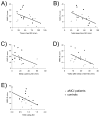Sleep influences the severity of memory disruption in amnestic mild cognitive impairment: results from sleep self-assessment and continuous activity monitoring
- PMID: 20592579
- PMCID: PMC3025089
- DOI: 10.1097/WAD.0b013e3181e30846
Sleep influences the severity of memory disruption in amnestic mild cognitive impairment: results from sleep self-assessment and continuous activity monitoring
Abstract
Sleep is important for declarative memory consolidation in healthy adults. Sleep disruptions are typical in Alzheimer disease, but whether they contribute to memory impairment is unknown. Sleep has not been formally examined in amnestic mild cognitive impairment (aMCI), which is characterized by declarative-memory deficits without dementia and can signify prodromal Alzheimer disease. We studied 10 aMCI patients and 10 controls over 2 weeks using daily sleep surveys, wrist-worn activity sensors, and daily recognition tests. Recognition was impaired and more variable in aMCI patients, whereas sleep was similar across groups. However, lower recognition of items learned the previous day was associated with lower subjective sleep quality in aMCI patients. This correlation was not present for information learned the same day and thus did not reflect nonspecific effects of poor sleep on memory. These results indicate that inadequate memory consolidation in aMCI patients is related to declines in subjective sleep indices. Furthermore, participants with greater across-night sleep variability exhibited lower scores on a standardized recall test taken prior to the 2-week protocol, suggesting that consistent sleep across nights also contributes to successful memory. Physiological analyses are needed to further specify which aspects of sleep in neurological disorders impact memory function and consolidation.
Figures



Similar articles
-
Sleep-Wake Patterns and Cognition of Older Adults with Amnestic Mild Cognitive Impairment (aMCI): A Comparison with Cognitively Healthy Adults and Moderate Alzheimer's Disease Patients.Curr Alzheimer Res. 2017;14(10):1030-1041. doi: 10.2174/1567205014666170523095634. Curr Alzheimer Res. 2017. PMID: 28545363
-
Concurrent impairments in sleep and memory in amnestic mild cognitive impairment.J Int Neuropsychol Soc. 2012 May;18(3):490-500. doi: 10.1017/S135561771200001X. Epub 2012 Feb 3. J Int Neuropsychol Soc. 2012. PMID: 22300710 Free PMC article.
-
Semantic clustering and sleep in patients with amnestic mild cognitive impairment or with vascular cognitive impairment-no dementia.Int Psychogeriatr. 2016 Sep;28(9):1493-502. doi: 10.1017/S1041610216000739. Epub 2016 May 12. Int Psychogeriatr. 2016. PMID: 27169617
-
Promoting Sleep Oscillations and Their Functional Coupling by Transcranial Stimulation Enhances Memory Consolidation in Mild Cognitive Impairment.J Neurosci. 2017 Jul 26;37(30):7111-7124. doi: 10.1523/JNEUROSCI.0260-17.2017. Epub 2017 Jun 21. J Neurosci. 2017. PMID: 28637840 Free PMC article. Review.
-
Sleep-dependent memory consolidation in healthy aging and mild cognitive impairment.Curr Top Behav Neurosci. 2015;25:307-30. doi: 10.1007/7854_2014_300. Curr Top Behav Neurosci. 2015. PMID: 24652608 Review.
Cited by
-
Technological Solutions for Older People with Alzheimer's Disease: Review.Curr Alzheimer Res. 2018;15(10):975-983. doi: 10.2174/1567205015666180427124547. Curr Alzheimer Res. 2018. PMID: 29701154 Free PMC article. Review.
-
Sleep Quality and Aging: A Systematic Review on Healthy Older People, Mild Cognitive Impairment and Alzheimer's Disease.Int J Environ Res Public Health. 2022 Jul 11;19(14):8457. doi: 10.3390/ijerph19148457. Int J Environ Res Public Health. 2022. PMID: 35886309 Free PMC article.
-
The Emerging Importance of Sleep Regularity on Cardiovascular Health and Cognitive Impairment in Older Adults: A Review of the Literature.Nat Sci Sleep. 2024 May 29;16:585-597. doi: 10.2147/NSS.S452033. eCollection 2024. Nat Sci Sleep. 2024. PMID: 38831959 Free PMC article. Review.
-
The impact of sleep on neuropsychological performance in cognitively intact older adults using a novel in-home sensor-based sleep assessment approach.Clin Neuropsychol. 2015;29(1):53-66. doi: 10.1080/13854046.2015.1005139. Epub 2015 Feb 2. Clin Neuropsychol. 2015. PMID: 25642948 Free PMC article.
-
A New Perspective on the Treatment of Alzheimer's Disease and Sleep Deprivation-Related Consequences: Can Curcumin Help?Oxid Med Cell Longev. 2022 Jan 12;2022:6168199. doi: 10.1155/2022/6168199. eCollection 2022. Oxid Med Cell Longev. 2022. PMID: 35069976 Free PMC article. Review.
References
-
- Jenkins JG, Dallenbach KM. Obliviscence during sleep and waking. Am J Psychol. 1924;35:605–612.
-
- Walker M, Stickgold R. Sleep, memory, and plasticity. Annu Rev Psychol. 2006;57:139–166. - PubMed
-
- Eichenbaum H, Cohen NJ. Conditioning to Conscious Recollection: Memory Systems of the Brain. New York, NY: Oxford University Press; 2001.
-
- Paller KA. Memory consolidation: systems. In: Squire LR, editor. Encyclopedia of Neuroscience. Oxford, England: Academic Press; 2009. pp. 741–749.
-
- Diekelman S, Born J. The memory function of sleep. Nat Rev Neurosci. 2010;11:114–126. - PubMed
Publication types
MeSH terms
Grants and funding
LinkOut - more resources
Full Text Sources
Medical

